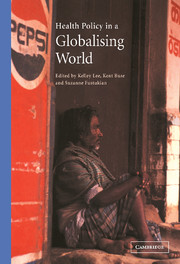Foreword
Published online by Cambridge University Press: 22 September 2009
Summary
Globalisation is one of the key challenges that public health faces in the twenty-first century. It is a major theme that is confronting many fields of public policy, but it is the health field that particularly illustrates the shared consequences of a globalising world, both its potential rewards and hazards. Infectious diseases, global trade, collective violence, ageing, health sector reform – all of these issues have determinants and consequences beyond individual countries. We are thus pressed to understand better the globalising processes that are confronting public health and somehow engage with them in order to make globalisation work better for health. We are pointedly aware that we are only beginning to do this. Globalisation in its present form could well be contributing to worsening health as long as a substantial number of people are being marginalised and disadvantaged by the process. Making globalisation work to the advantage of all – rich or poor – is a hard challenge.
This book is a timely contribution. It is important reading for those who want to understand some of the major health consequences of globalisation better. More specifically, the book's concern with how health policy is made – who is involved, which processes are taking place, what changes are happening to the broader context of policy-making – has not yet been addressed elsewhere. The case studies provided illustrate that domestic and foreign policy is being increasingly blurred, and that globalisation is far from creating a globally inclusive policy environment.
- Type
- Chapter
- Information
- Health Policy in a Globalising World , pp. xix - xxPublisher: Cambridge University PressPrint publication year: 2002
- 1
- Cited by

